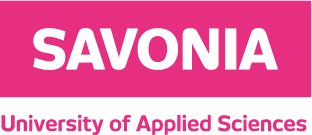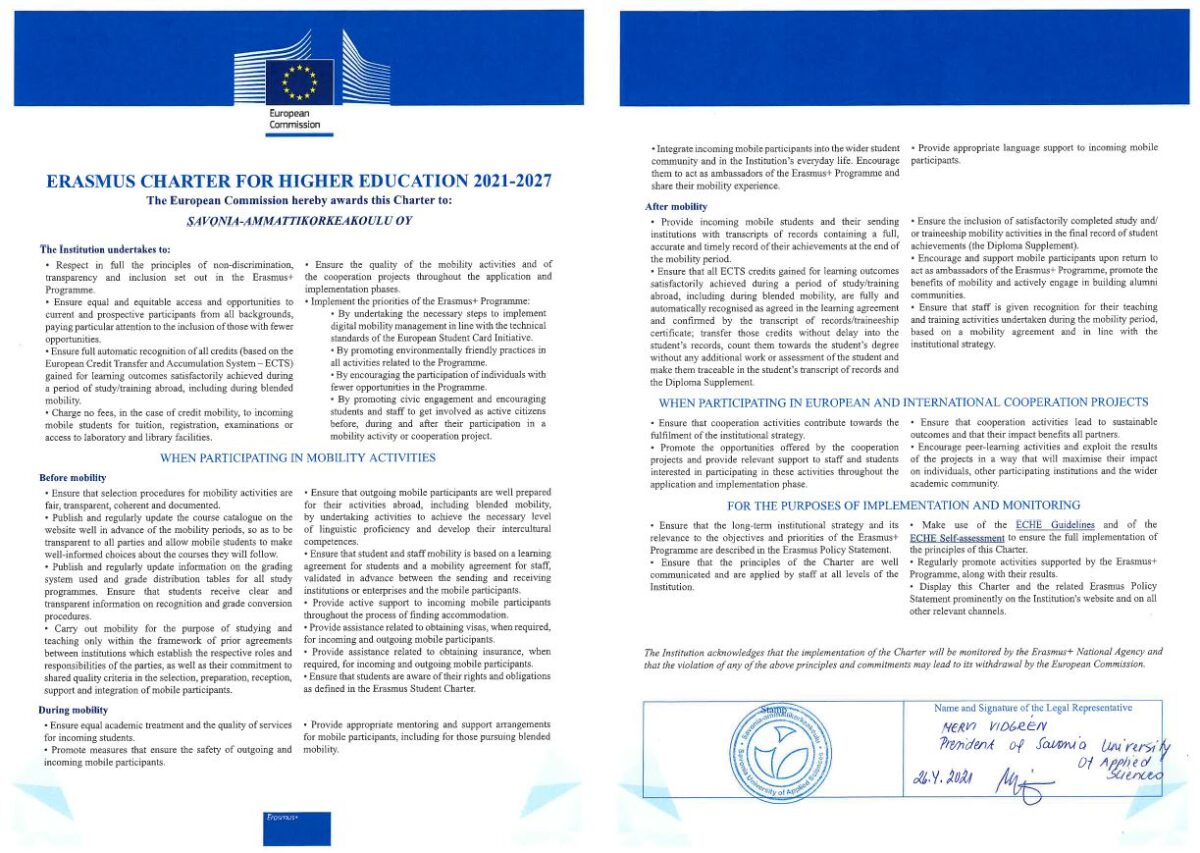European Policy Statement

European Policy Statement 2021-2027 – Savonia University of Applied Sciences
The vision of Savonia University of Applied Sciences is to be the most responsibly influential university in Finland by 2030, where every student is an individual and where the culture of competence is built on the basis of strong networking and sharing expertise. Savonia aims at actively utilizing the expertise of its partnership network and shares its own expertise with the partners.
Savonia’s strategic goal is to offer education in a diverse and flexible way. The pedagogical starting point is the diverse combination of high-quality and work-related education and research and development (model called OIS 3.0). In work-related education, students’ motivation and commitment to studies are emphasised. The diverse virtual and physical environments on Savonia’s campuses and in the premises of network partners both at home and abroad integrate theory and practice extensively and interestingly into learning process of the students and to organisational development.
Digitalisation is strongly reflected in Savonia’s educational offerings, which have increasingly become national and even global. The principles and criteria of the Erasmus Programme are strongly based on the need for broad social impact. This effectiveness is achieved by addressing major global challenges through a variety of parallel missions. Savonia’s strategy is based on a global framework in which (UN defined) Human Security combines different types of global challenges and looks at people and their well-being rather than structures.
Savonia implements the internationalisation programme of the common national vision of the higher education institutions of Finland. International cooperation develops operations and increases the effectiveness of education, RDI and business. Savonia’s competence is renewed in international cooperation and functioning networks. Students are put to work in international networks of their field during their studies. Target is that everyone who graduates from Savonia has the ability to work internationally and in global context.
Internationalisation is one of the selected strategic development areas in Savonia strategy for 2021–2024. According to the strategy, Savonia will gradually increase its English degree programme offering by 2030. The offering takes into account the expert needs of Finnish working-life. Savonia will promote educational and work-based immigration by developing flexible degree and lifelong learning pathways for students and experts with a foreign background, as well as services supporting integration and employment of international students. Furthermore, the international competences of students in Savonia will be improved by increasing virtual mobility and strengthening the international competence of staff.
Savonia’s strategy is based on a global framework in which Human Security connects different types of global challenges from a human well-being point of view. This crosscutting theme is implemented in all study fields so that the students recognise human security and sustainable development as part of their expertise and global responsibility.
Participation in the Erasmus programme supports the achievement of all the above goals and enables activities that would not be possible without the support of the Programme. The main functions of the Programme for Savonia are the mobility of students and staff, as well as participation in projects to develop education together with its strong European partners. The mobility activities are carried out following the European standards laid out in the Erasmus programme e.g. including the principles of the ECTS.
Savonia wants to be developing a new kind of international learning environment during the new Programme period, in which the international competence of both staff and students will increase. This will mean even broader and deeper cooperation with the long-term key partners.
In its strategy Savonia UAS has set a goal to be a genuinely international university educating professionals, who have capacity and necessary skills for international work and who are internationally competitive and open-minded experts. The Erasmus programme enable international mobility and cooperation between Savonia and its partner universities both in and outside the Europe. Erasmus creates impacts that are not just important for Savonia itself as a higher education institution but for the whole of the surrounding region.
The objective of student mobility is to develop professional, cultural and linguistic abilities during the exchange at the partner institutions and in the traineeship organisations. This will support students’ employment opportunities. All degree students are offered equal and high-quality opportunities for internationalisation. During the Programme period possibilities for developing blended mobility and virtual exchanges will be discovered and effort will be put that these actions will take place on all study fields.
In regards to staff mobility the goal is to increase the amount of teachers and other staff members who will develop their expertise abroad and also share their skills and know-how at partner institutions through teaching and project work. Equal opportunities and support services are offered for all the staff.
At Savonia UAS, the maintenance of mobility cooperation is the responsibility of the designated international coordinators of the study fields who act according to the mutual institutional level quality guidelines. The international coordinators and the degree programmes outline the content of new and renewed agreements in communication with the partners. Quality guidelines and the close cooperation of departments and centralised international services ensure that guidelines and practices, including those related to bilateral inter-institutional agreements of the Erasmus programme, are consistent and that their content complies with the requirements of e.g. the Erasmus Charter. The management of Erasmus inter-institutional agreements is the responsibility of the centralised services. Joint guidelines and understanding of the Programme’s principles ensure the equal treatment of students and make sure the possibilities of the Programme are widely informed.
Active international partnerships enable effective RDI activities and at Savonia UAS the cooperation projects of the Erasmus programme are seen as an important aspect for the internationalisation strategy. International cooperation projects made possible by the Programme are natural ways for increasing interaction and transfer of knowledge and while impacting to Savonia’s education, RDI and management they will reflect to the whole surrounding region. Savonia has outlined its RDI focus areas, which represent a strong national level. It is expected that these focus areas are also engaged in international research cooperation where European projects play a major role.
Savonia is developing new graduate degree programmes under its new Master School umbrella to meet the current needs of the surrounding society. The possibility to create joint Erasmus Mundus Master’s programmes with the international partners strongly supports the initiative of an internationally recognized Master School.
To implement its strategy tied around the theme of human security and sustainable development, Savonia sees the need for international cooperation. The European Universities initiative provides a framework for Savonia and its partners to create a human security themed university coalition that produces joint study programmes that have a vast impact at the European and international level.
As a university focusing on impact creation, Savonia is an active operator in international policy development. International policy development projects also serve the goas of human security as the development of policies is often needed in order to solve the issues of human security.
During the ongoing Programme period about 150 students from Savonia have annually participated to the Erasmus+ exchange activities and at the same time around 200 students have every academic year studied at Savonia UAS’ campuses. For the new Programme period Savonia sets an objective to achieve a substantial increase in incoming and outgoing student mobility, in order to give students opportunities to gain first hand experiences in international and intercultural contexts, either on the home campus or abroad. The aim is to develop virtual and blended mobility options on all of the study fields jointly with the European and international partner institutions. Savonia’s aim for year 2024 is that half of all students will participate in international mobility activities, including blended and virtual mobility. Possibilities of the Erasmus+ programme play a key role to achieve this goal.
Staff mobility is seen as an important part of personnel’s professional development and during the Programme period attention will be paid that the mobility would become a natural and an integral part of professional development of wider group of teachers on all study fields and of other staff groups. In 2019 about 30% of Savonia staff participated in international mobility activities, and the aim is to increase the participation to 50% in year 2024. This indicator relates also to a qualitative goal according to which Savonia enhances the internationalization competences of its staff.
Savonia has set a goal to be an actor in international RDI projects that produce new innovations in accordance with the values of sustainable development and human safety. It therefore pursues to increase its involvement in international research and development projects. It has past experience in policy development projects where Savonia has been able to contribute and share its best practices e.g. in the structuring of higher education in developing countries.
By co-creating competitive joint Master’s and Bachelor degrees with its European and international partners Savonia aims to attract talents from all around the world to boost the vitality and multiculturalism of the region. This will have a long-term impact on the surrounding society.
Savonia sees the European Universities scheme as a way to build a consortium of data around the global theme of human security. The fruits of this consortium would benefit all nations facing the challenges of global issues such as global warming, food security and sustainable societies. The Erasmus programme would thus allow this university consortium to race future professional who are experts in these fields and who can create solutions to the current burning questions of human security at national and international level.

